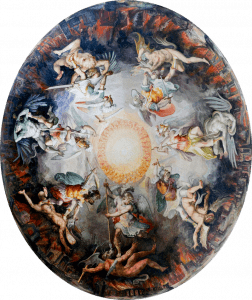 The text for today is absolutely replete with Mark’s characteristic stylistic gems, while summarizing his claims about Jesus and moving the plot of the gospel speedily along. This story is told directly after the disciples have asked our central question once again: “Who is this, that even the wind and sea obey him” (Mark 4:41)? Wind and sea may obey this Jesus, but few if any of the humans in the story ever will, at least will obey him to the full. Now comes a long narrative wherein demons understand and do Jesus’s bidding immediately, while the humans either stand amazed or try in several ways to thwart what his will is, thus in effect denying once again the gospel summary of 1:15.
The text for today is absolutely replete with Mark’s characteristic stylistic gems, while summarizing his claims about Jesus and moving the plot of the gospel speedily along. This story is told directly after the disciples have asked our central question once again: “Who is this, that even the wind and sea obey him” (Mark 4:41)? Wind and sea may obey this Jesus, but few if any of the humans in the story ever will, at least will obey him to the full. Now comes a long narrative wherein demons understand and do Jesus’s bidding immediately, while the humans either stand amazed or try in several ways to thwart what his will is, thus in effect denying once again the gospel summary of 1:15.
“They came to the other side of the sea” (Mark 5:1), suggesting that the crowd following Jesus has now left Jewish territory and entered Gentile land. The precise location is confused between Gerasa, a large community, some 30 miles southeast of the seacoast, Gedara, a town barely six miles inland, and Gergasa, whose ancient location is unknown. It may well be that Mark was essentially unfamiliar with the geography of the area and chose a place not quite suitable geographically for his story. The important fact is that Jesus has now come to Gentile land; that fact is made even clearer by the existence of a large herd of pigs, animals strictly off-limits to faithful Jews. And the uncleanliness of that place is emphasized by the description of the “man controlled by an unclean spirit,” dwelling among tombs, another site of certain taboos against cleanliness, and possessed of near-miraculous strength, breaking chains and fetters with ease, howling day and night in obvious physical and psychological pain, and attempting to destroy himself with stones, lacerating his own body over and over.
But Jesus appears, and the man’s behavior immediately changes. He sees Jesus at some distance, but clearly recognizes him, for he runs up to him, prostrates himself at Jesus’s feet, and shouts for all to hear, “What do you want with me, Jesus, you son of the Most High God? For God’s sake, don’t torment me—because Jesus had been saying to it (the spirit): ‘Come out of the man, you filthy spirit’” (Mark 5:7-8)! We are reminded of the near exact words from Jesus’s first exorcism at Mark 1:24; the spirits here speak precisely as the one spirit speaks there. The point is that the unclean spirits immediately know the identity of Jesus; he is earlier “the Holy One of God,” while here he is “son of the Most High God.” These recognitions contrast sharply with the disciples’ lack of recognition just witnessed at Mark 4:41.
And Jesus, in turn, fully recognizes the filthy spirit that is tormenting the sad man in the tombs, and demands to know the spirit’s name. In the ancient world, to know the name of someone is to have at least partial control over that being. The spirit replies, “My name is legion, for we are many” (Mark 5:9). A Roman legion could contain as many as 6,000 soldiers, so this demon is formidable indeed. But just as Jesus has proven stronger than the powerful man in the tombs, binding him with words of power, so now he will show himself as more powerful even than a many-sided demon. Already, this demon recognizes Jesus’s superior strength, begging him not to send them out of this Gentile land. Spotting a large herd of pigs nearby, the spirits ask Jesus to send them out of the man and into the pigs. “So he gave them permission. And the filthy spirits came out and entered the pigs, who, numbering about 2000, rushed down the steep bank and were drowned in the sea” (Mark 5:13). Not only have the unclean spirits been vanquished, but apparently they have been destroyed, along with the filthy pigs. This Gentile land has been thoroughly cleansed by the Jewish exorcist, Jesus.
But that is hardly the end of the matter, because “the swineherds ran off and told it in the city and in the country. Then people came to see what it was that had happened” (mark 5:14). The words and actions of Jesus always have consequences, and there is no exception here. The swineherds and a great crowd of others who have heard the news go to the tombs, where they see Jesus all right, but more astonishingly they see the former madman now clothed and calm, the very one who had had the demon. “And they were afraid,” says Mark. The source of their fear is not straightforward. Are they afraid because all their pigs, their livelihoods, are dead? Are they afraid because the man they knew well as mad and dangerous, one who belonged away from them in a place of evil, is now quiet and one of them? Are they afraid because Jesus has such incredible power and authority, though he is obviously a foreign Jew who has upset their comfortable land with deeds of power? Perhaps their fear is the result of all three realities.
According to Mark, their first reaction is “to beg Jesus to leave their neighborhood” (Mark 5:17). There is no praise of God for mighty deeds, no sign of thanks for curing the mad man, no desire to follow this Jesus anywhere at all. Jesus has made his mark on them, and they want no more of that. In short, the people of Gerasa can hardly wait for this Jesus to ply his trade, whatever it may be, elsewhere. They are like so many through the ages who have sampled the power of Jesus to change the world and decided such power was not for them, since they rather like the world the way that it is, thank you very much! Pigs roam the countryside in safety, “mad men” or marginalized ones stay in tombs where they belong, while the “good” folk live their lives in peace.
At the end of the tale, the formerly unclean man begs Jesus to allow him to come with him wherever he is going, but Jesus instead commands him to “go home to your friends, and tell them how much the Lord (Jesus? God?) has done for you, what mercy he has shown you” (Mark 5:19). In other words, Jesus makes the man an evangelist, urging him to tell everyone what has happened to him. This sounds like a stark exception to that famous Markan “messianic secret” that I have referred to in earlier essays. Why should Jesus demand that this man “tell,” while he strictly demanded that the cured leper in Mark 1 say nothing at all? Well, the circumstances of the two stories are different. In the former, the leper is asked to go the priests to prove the cure is real, and then to go to his home, while here the man of the tombs is asked to tell all about his new life. The point in both cases is that the men are restored to the community, a community that has formerly shunned and forgotten the men as forever lost. And in the latter case, the man becomes an evangelist for what Jesus has done, “preaching in the Decapolis.” The result is that “everyone was amazed” (Mark 5: 20). We note that Jesus never preaches in this place of the Gentiles, but the good news is proclaimed there by the former outcast. In both instances the community is made once again whole through the power of Jesus. The rule of God is indeed near, and it is past time to change one’s mind and believe in the good news. Mark 1:15 is being realized through the ministry of Jesus, though that realization comes in many and various ways.
(Images from Wikimedia Commons)











